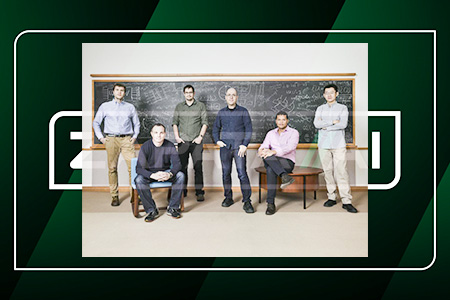
Quantum Computing
In a significant setback for the quantum computing sector, Boston-based start-up Zapata Computing has announced its shutdown. Founded from Harvard University’s renowned chemistry department, the ambitious company aimed to revolutionize computing through quantum mechanics. However, financial struggles and market challenges have ultimately led to its downfall, highlighting broader issues within the quantum computing industry.
A Promising Start: From Harvard Labs to Wall Street Hype

The founders, Harvard researchers wanting to tap the power of quantum mechanics to build software that could eventually work both on existing classical computers and on future quantum systems, launched Zapata Computing in 2017. Its innovations attracted early enthusiasm most strongly in fields such as artificial intelligence and machine learning, where quantum technology held out the prospect of transformative gains.
The most pivotal moment for the startup came in April 2024, when it went public via a SPAC merger. Initially, Zapata’s public debut generated optimism and excitement within the tech world, with stock prices climbing above $15 per share. Investors were hopeful that the company could soon commercialize its technology and transform industries like pharmaceuticals, finance, and AI. But that hype was very short-lived, and this company’s stock price quickly started to free fall, reaching a low of less than 8 cents.
The Killer Financial Deal
While some of the troubles at Zapata indeed reflected deep skepticism in the market around quantum technology, the financial kill can be located in a deal that it made in March 2024 with the Boston-based investment firm Sandia Investment Management. One important contingency: if the stock of Zapata traded under $1 for 20 days out of any 30-day period, the company would be required to pay Sandia the nearly $2.5 million figure. The stock soon fell and triggered the contingency; because it was already strapped for cash, Zapata could not meet the payment obligation.
In a filing with the securities regulators, Zapata announced it could not pay its debts-a virtual end to operations. The leadership further acknowledged that the company was unlikely to recover, thus leaving little hope for investors and stakeholders alike.
A Broader Industry Struggle
The collapse of Zapata is not an incident that occurred in isolation. Other quantum computing companies similarly went public via SPACs, and all have equally gone through similar distress. Another key player, D-Wave Quantum, lost as much as 90% of its stock following its SPAC merger in 2022. This underlines the contrast between the promises of quantum computing and the crawling pace of technological and commercial advancement.
While quantum computing could potentially disrupt everything from pharmaceuticals to cryptography, the truth is it is still an infant technology. The chasm between major theoretical advances and scalable real-world uses is rather wide. Slower progress to date has disappointed investors eager for quick returns and skeptical markets for quantum startups.

Human Cost and Leadership Changes
The immediate effects of Zapata’s closure are being felt most acutely by its employees. Most of the company’s 52 full-time staff were laid off on 9 October 2024. Furthermore, the resignation of CEO Christopher Savoie signaled the full shutdown of the company.
Unlike other troubled companies, Zapata will not file for bankruptcy protection. The leadership has said that it would try to fulfill as many financial obligations as possible but expect no assets to remain for common stockholders.
Lessons for the Future of Quantum Computing
The failure of Zapata serves as a word of caution to the quantum computing industry, which is still an emergent field with great long-term promise but significant near-term challenges. First and foremost, it is a reminder that even though quantum technology is extremely promising, commercial applications remain further away than many of those early investors and startups hoped. That mismatch between expectations and reality has been a kind of constant theme throughout the wave of failed or otherwise struggling quantum companies.

It does, however, underline a need for more sustainable business models in the sector. This is primarily a space taken up by quantum startups that are focused on basic research and development and are not ready to go to the public markets or large-scale commercialization. Rather, longer periods of private investment and government funding would serve these firms well, allowing them to focus on the slow and painful work of moving the technology along without the immediate pressures of responding to market demands.
Moreover, the fall of Zapata will force investors to revisit their expectations. Quantum computing is a sector in which one should not expect quick profits. As this technology matures, all stakeholders may have to adopt a more patient, long-term view.
What’s Next for Quantum Technology
But with the closure of Zapata, and other setbacks, the search for quantum computing breakthroughs does not stop. Large companies such as IBM, Google, and Microsoft have been seriously investing in the technology, and it might still change how we conceive computing.
The closure of Zapata could mark a point of inflection in the industry, where startups and investors alike reassess challenges ahead and adjust their strategies accordingly. The field may, in the longer term, benefit from a more measured and realistic approach to its commercialization and development.

The death of Zapata Computing serves as a stark reminder that even the most inventive industries are no guarantee of success. The promise of quantum computing may be huge, but it will take patience, persistence, and further learning of complexities around making such a revolutionary concept work as a practical and profitable technology.
What is the quantum computing?
Quantum computers utilize quantum mechanical phenomena and, for specific types of calculations, are significantly faster than conventional computers. The basic unit, known as a qubit, can exist in a superposition of states, which upon measurement can exhibit probabilistic properties. Wave interference is used by quantum algorithms to amplify desired outcomes. It is a challenging process to engineer reliable qubits due to issues such as quantum decoherence; quantum computers are, at present, very much experimental machines. But while quantum computers will, in certain cases, offer an exponential speed increase, such as breaking cryptography and simulation of physical systems, the practical applications are still few and far between, and this is a field that’s really in its infancy.